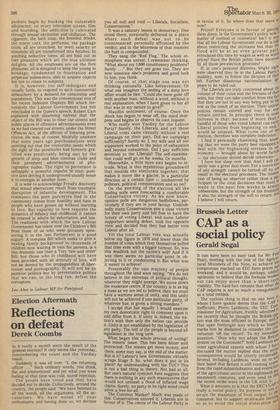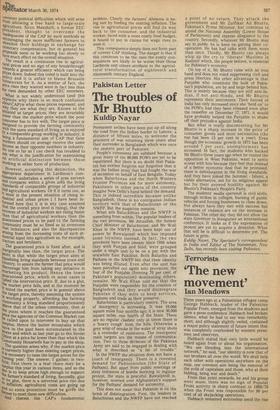Brussels Letter
CAP as a social policy
Gerald Segal
It can have been no easy task for Mr Pre;1 Peart, meeting with the rest of the Agricur tural Ministers of the Nine, to achieve tilet; compromise reached on EEC farm prices lais, weekend, and it would be, perhaps, und,.1•Te, optimistic to believe that the formula woric` I out can enjoy more than a short-terlfil viability. The hard fact remains that what th,e CAP requires is not so much a renegotiatia'' as a total rethink. The curious thing is that no one here t,I3 whom I have spoken denies that the CAP l' inefficient. Pierre Lardinois, the EEC C°11/:0 missioner for Agriculture, frankly admitted' me recently that he thought the British alisi;. tern was the most efficient in Europe; arw.,'' that open forthright way which so haPPI' '' marks him he disdained to consider the ca"Ee versation 'off the record'. To my immectia,,D question, "then why not adopt the BritI'd system on the Continent?" both Lardinois arte otner agricultural experts with whom I hal discussed the matter replied that the sociae. consequences would be utterly intolerablcid Several, including Lardinois, went on to a d, their belief that Britain is still running scar.eol from the rapid industrialisation and restricn of the agricultural sector in the eighteenth ally nineteenth centuries, and even tend to lin the recent strike wave in the UK with it i5 What it amounts to is that the EEC's CAP•„' really a social policy. Its purpose is not rel secure the maximum of food output to trio consumer, but to support small-scale farraill so as to avoid the social dislocation an
ulererore political difficulties which will arise from. allowing a free hand to large-scale
agriculture. Sicco Mansholt, a former EEC president, thought to overcome the Inadequacies of the CAP by such methods as encouraging the more inefficient farmers to abandon their holdings in exchange for monetary compensation, but in general his FlroPosals seem to be working too slowly to ave much effect on the overall situation.
The result is a continuous rise in agricultturai Prices and no sign of any breakthrough °Wards a greater efficiency which can bring
Prices down. Indeed this trend is built into the policy and it is unfair to blame Brussels oureaucrats for it. As a matter of fact, the
Price rises they wanted were in fact less than the rises demanded by other EEC members. What is not widely understood (and this explains why there is so much confusion aboutcAp)is what these prices represent, and
Y"Fl. Y they are what they are. Known to the Initiated as target prices, they are invariably
lower than the market price which the poor
consumer has to live with. The target price is designed to provide the farming community th the same standard of living as is enjoyed 1.a comparable group working in industry, it
being a fundamental aim of CAP that farm !vorkers should on average receive the same come as their opposite numbers in industry. 'No one so far as I can check has troubled to ask what is the justification for maintaining an artificial distinction between those working in either form of production.
However, accepting this distinction, the appropriate department in Lardinois's con"IMssarait undertakes a series of area surveys and compares within a given arTa the living standards of comparable groups of industrial fld agricultural workers. Or if it turns out, as It Must in the present situation of rising industrial and urban prices ( I have been informed here that it is in any case assumed that the overall price level is rising), that the 112comes of industrial workers are rising faster than that of agricultural workers then the gUaranteed prices to be paid to the farming community must be so fixed as to overcome that imbalance, and also the discrepancies arising from the increasing costs of such industrial input into agriculture as, for example, tractors and fertilisers.
The guaranteed price is fixed after, and is Marginally less than, the target price. The Point is that while the target price aims at eqUalising living standards between town and cptintry, to assure the farmer that price would tascourage him from taking any initiative in Marketing his product. Hence the lower enaranteed price, which in most cases is called the intervention price. If, due to a glut, t.he market price falls, and at the moment be It rioted the market price is in general above 91e target price, thereby assuming the system Is Working properly, affording the farming eo,Mmunity a living standard proportionately apove that of the urban community, then at the point where it reaches the guaranteed treice the agencies of the Common Market can called upon to intervene to buy up that ,,'plus. Hence the butter mountains which gave in the past been accumulated in the Ores and which as last year go to the Soviet ollion at a price far lower than that which the 'ornmunity Housewife has to pay in the shop. . The question arises why, if the market price ,urrently higher than existing target prices, is necessary to raise the target prices for the rciming year. The answer, I gather, is two_old; first there is a fear there may be a 49rPlus this year in various items, and so the
is to keep prices high ,enough to support 'le farmer's standard of living. Secondly, glut or
t no glut, there is a universal price rise due o inflation; agricultural costs are going up. rad so extra protection must be giva the rrner to meet these new difficulties.
And therein lies CAP's fundamental problem. Clearly the farmers' dilemma is being met by feeding the existing inflation. The rise in agricultural prices will find its way back to the consumer, and the industrial worker, faced with a more costly food budget, is bound to put in claims for wage rises to meet it.
This consequence simply does not form part of current CAP thinking. The danger is that if this continues to be the case the costly consequences are likely to be worse than those Lardinois and others attribute to the agricultural transformation of eighteenth and nineteenth century England.



































 Previous page
Previous page